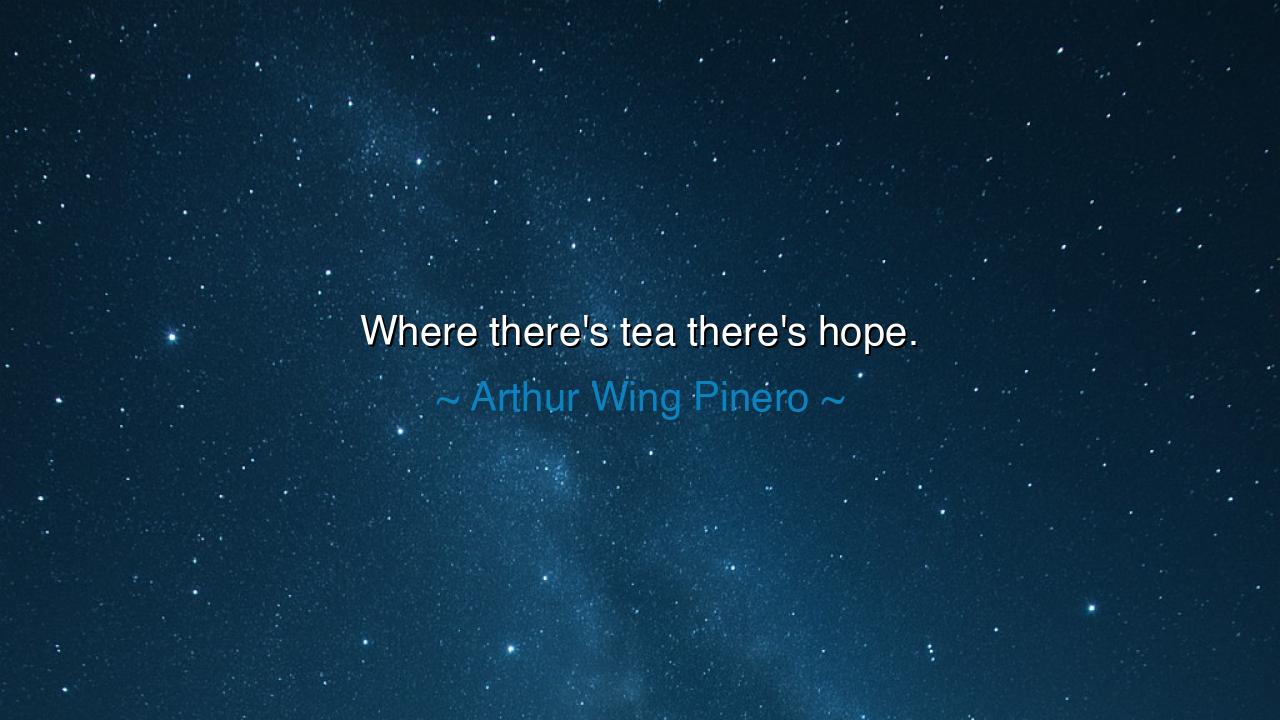
Where there's tea there's hope.






“Where there’s tea, there’s hope.” Thus spoke Arthur Wing Pinero, the English playwright whose words, though simple, carry the quiet wisdom of centuries. In this gentle saying lies not only affection for a humble drink, but a reflection of the eternal truth: that even in the smallest rituals of life, there resides the seed of renewal. It is a phrase that whispers comfort across time, for tea — that most ordinary of companions — becomes here a symbol of endurance, of grace in the face of despair, and of the calm strength that sustains the human spirit when the storm has not yet passed.
The origin of this quote reaches back to a culture that revered tea not merely as refreshment, but as ceremony, as meditation, as connection. In the East, the act of preparing tea was an art form — a dialogue between soul and substance. The Japanese tea ceremony, for instance, was a practice of profound simplicity: the pouring of water, the measured stirring of leaves, the silent sharing between host and guest. Every motion was deliberate, every breath a prayer to presence. Through it, one learned that peace is not found in grand victories, but in small, steady acts of mindfulness. When Pinero wrote these words in the heart of Victorian England, he echoed that ancient truth: that when all else fails, one might still sit, hold a cup, and find in its warmth a reason to hope.
For there are moments in every life when hope seems far — when the weight of grief, loss, or uncertainty makes even the sun seem dim. Yet it is often in those very hours that the smallest comfort becomes salvation. Think of Winston Churchill, during the darkest days of the Second World War, pacing the war rooms beneath London as bombs fell above. Even as the city trembled, he demanded his pot of tea — that ordinary ritual that tethered him, and those around him, to a sense of continuity. Amid chaos, the act of pouring and drinking was a declaration: We still live. We still endure. We still believe in tomorrow. Thus, tea became not luxury, but symbol — the everyday act that defies despair.
To say “Where there’s tea, there’s hope” is to recognize that hope does not always roar. It often whispers — in the sound of boiling water, in the rising steam, in the simple pause that allows one to breathe again. It is the wisdom of the patient heart, the one that does not demand miracles but cherishes moments. In the rhythm of life, tea teaches us stillness. The ancients understood this balance — that great strength often hides in gentleness. Just as the mountain streams feed the green leaves, and the leaves in turn yield warmth and clarity, so too does hope nourish those who remain calm and attentive in the midst of trial.
There is also within this quote a profound democracy of comfort. Tea, unlike wine or gold, is the drink of all people — of kings and beggars, of workers and poets. It is the thread that runs through the fabric of humanity, binding rich and poor alike in the same ritual of pause and renewal. It reminds us that hope belongs to everyone, not just to those who are fortunate, but to anyone willing to stop, to sit, and to remember that the world still holds beauty. The first sip, the warmth in the hands, the calm that follows — these are universal acts of grace, proof that no darkness is total while even a single small comfort endures.
The story of Anna Pavlova, the great ballerina, captures this spirit. In her final days, weakened by illness, she could no longer dance — the art that had defined her soul. Yet she asked each morning for her tea, and those close to her said she held the cup as though it were a chalice. Though her body failed, that small ritual gave her dignity and peace. She found in it a rhythm still her own — the reminder that life’s beauty need not vanish even when its grandeur fades. Through her, we see that hope is not the absence of suffering, but the will to keep cherishing what is left.
So, my child, when you feel weary or lost, remember the wisdom hidden in this quiet proverb. Find your own cup of tea — whatever act restores your stillness, however small or ordinary. Let it be a reminder that even amid the noise of the world, you are capable of calm, of gratitude, of quiet joy. Hope is not always a grand vision of the future; sometimes it is the simple act of saying, “I will stay, I will sit, I will breathe.”
And thus, remember this truth: hope begins wherever peace is chosen. As long as there is tea — as long as there is pause, reflection, and kindness — there will always be the possibility of light. The storms may rage, the future may waver, but if the heart can still find warmth in the smallest of things, then all is not lost. For where there is tea, there is hope — and where there is hope, there is life.






AAdministratorAdministrator
Welcome, honored guests. Please leave a comment, we will respond soon